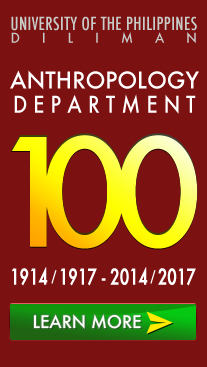Felipe Landa Jocano: Professor Emeritus, UP
Written by Carolyn I. Sobritchea, PhD, UP Asian Center.
 Felipe Landa Jocano, Professor Emeritus, is one of the country’s foremost anthropologists. He is widely known, here and abroad, for his numerous field studies and publications on Philippine folklore, pre-history, cultural communities, folk medicine and organizational culture. He completed his BA degree in 1957 from the Central Philippine University, and his MA (l962) as well as PhD degrees (l963) in anthropology from the University of Chicago, Illinois, USA. Among his outstanding works are Sulod Society (1968); Growing Up in a Philippine Barrio (1969); Slum as a Way of Life ( 1975), Philippine Prehistory (1998) and the Hinilawod, a Central Visayan Folk Epic (reprinted 2007).
Felipe Landa Jocano, Professor Emeritus, is one of the country’s foremost anthropologists. He is widely known, here and abroad, for his numerous field studies and publications on Philippine folklore, pre-history, cultural communities, folk medicine and organizational culture. He completed his BA degree in 1957 from the Central Philippine University, and his MA (l962) as well as PhD degrees (l963) in anthropology from the University of Chicago, Illinois, USA. Among his outstanding works are Sulod Society (1968); Growing Up in a Philippine Barrio (1969); Slum as a Way of Life ( 1975), Philippine Prehistory (1998) and the Hinilawod, a Central Visayan Folk Epic (reprinted 2007).
Dr Jocano taught at the University of the Philippines for nearly half a century. He first joined the Department of Anthropology in l967 then moved to the Asian Center in 1973 as Professor of Philippine Studies. He served as Chairman of the UP Department of Anthropology, Director of Philippine Studies Program at the UP Asian Center, Dean of the UP Institute of Philippine Studies, and Head of Asian Center Museum Laboratory. He played a key role in developing the content and direction of the graduate program in Philippine Studies as well as the training programs for government personnel of various government agencies such as the Foreign Service Institute of the Department of Foreign Affairs, Department and the National Defense College. As the head of the Asian Center Museum Laboratory, he spearheaded the collection of cultural materials and photographs of ethnic groups across the country for use in graduate studies and appreciation, primarily of scholars and students. He strongly argued for the rereading of pre-colonial history and challenged the overly diffussionist slant of early works on this period.
Many of Dr Jocano’s pioneering ethnographies on Filipino values, folk medicine and early-childhood socialization practices, among others, provided rich data for the development of culturally-sensitive policies and programs of schools and various government agencies. Indeed, his pioneering efforts to influence development practitioners to ground their work on anthropological knowledge has immensely contributed to the pursuit of policies, programs and services that are attuned to the diverse values, social contexts and aspirations of Filipinos.

His laudable achievements did not go unnoticed. He received numerous awards from various sectors of society and these include among others the Ten Outstanding Young Men (TOYM) award in 1965, the 1971 Cultural Heritage Award, given by the Philippine Government and the National Science Special Award of Merit in 1974, given by the National Science Development Board (NSDB).
In 1988 he received the most distinguished 12 Top Scientists of the Philippines Award from the National Research Council of the Philippines (NRCP). He was given the Lifetime Achievement Award in 2006 by the National Museum and the University of the Philippines (UP) Archaeological Studies Program and conferred by the Philippine government in 2007 the Membership into The Philippine Legion of Honor with the rank of Maringal na Pinuno (Grand Officer).
But what is perhaps the most valuable contribution of Dr. Jocano is the knowledge and skills he imparted to his students. As a classroom teacher and fieldwork supervisor, he is fondly remembered for teaching people-centered ways of doing social science research. He ensured the safety and security of everyone in the field even as he also cautioned them to be always respectful of the norms and practices of the communities being studied. He passed on to his students the legacy of grounded theorizing and reflexive ethnography.
Read During the Dangal ng Haraya Award (cultural and Historical Research)
For Dr. F. Landa Jocano (Filipino Anthropologist) by the National Commission for Culture and the Arts (NCCA)
22 May 2014, 600 pm,
NCCA Lobby, NCCA Building
633 General Luna St., Intramuros, Manila
Felipe Landa Jocano
Professor Emeritus, UP
February 5, 1930 – October 27, 2013
Share This Page
Latest Updates

